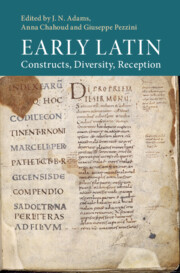Book contents
- Early Latin
- Early Latin
- Copyright page
- Dedication
- Contents
- Illustrations
- Tables
- Contributors
- Acknowledgements
- Abbreviations
- Chapter 1 Introduction: What Is ‘Early Latin’?
- Part I The Epigraphic Material
- Part II Drama
- Part III Other Genres and Fragmentary Authors
- Part IV Reception
- Chapter 20 ‘Early Latin’ and the Fragments of Atellane Comedy
- Chapter 21 Lucretius and ‘Early Latin’
- Chapter 22 Cicero and Early Dramatic Latin
- Chapter 23 Early Latin Texts in Livy
- Chapter 24 Pliny Rewrites Cato
- Chapter 25 Gellius’ Appreciation and Understanding of ‘Early Latin’
- Chapter 26 Views on ‘Early Latin’ in Grammatical Texts
- Chapter 27 Nonius Marcellus and the Shape of ‘Early Latin’
- Chapter 28 ‘Early Latin’ to Neo-Latin
- Chapter 29 Conclusions
- Bibliography
- Index Verborum
- Index of Non-Latin Words
- Index Locorum Potiorum
- Subject Index
Chapter 27 - Nonius Marcellus and the Shape of ‘Early Latin’
from Part IV - Reception
Published online by Cambridge University Press: 27 July 2023
- Early Latin
- Early Latin
- Copyright page
- Dedication
- Contents
- Illustrations
- Tables
- Contributors
- Acknowledgements
- Abbreviations
- Chapter 1 Introduction: What Is ‘Early Latin’?
- Part I The Epigraphic Material
- Part II Drama
- Part III Other Genres and Fragmentary Authors
- Part IV Reception
- Chapter 20 ‘Early Latin’ and the Fragments of Atellane Comedy
- Chapter 21 Lucretius and ‘Early Latin’
- Chapter 22 Cicero and Early Dramatic Latin
- Chapter 23 Early Latin Texts in Livy
- Chapter 24 Pliny Rewrites Cato
- Chapter 25 Gellius’ Appreciation and Understanding of ‘Early Latin’
- Chapter 26 Views on ‘Early Latin’ in Grammatical Texts
- Chapter 27 Nonius Marcellus and the Shape of ‘Early Latin’
- Chapter 28 ‘Early Latin’ to Neo-Latin
- Chapter 29 Conclusions
- Bibliography
- Index Verborum
- Index of Non-Latin Words
- Index Locorum Potiorum
- Subject Index
Summary
Nonius Marcellus’ intellectual tendencies, contemporary concerns and treatment of the Roman literary past are the subject of this study, which contends that the author’s predilections and intended readership often guided his selection of quotations, affected his presentation of them, and, consequently, shaped our reception of early Latin we know principally or exclusively from the De compendiosa doctrina. Nonius was selecting not merely ‘old words’ regardless of their valence, but more precisely those old words that could be incorporated with minimal accommodation into the speech patterns of fourth-century North Africa. This means that his collection of Latinity often has as much to do with imperial, provincial, and formal public speech as it does with republican Latin literary styles; that Nonius was more attuned to the philosophical, intellectual, theological, and cultural implications of the texts that he was excerpting than has yet been recognised; and that he probably bequeathed us a collection of literary Latin distorted by his own interests and concerns, and by his readers’ particular needs.
- Type
- Chapter
- Information
- Early LatinConstructs, Diversity, Reception, pp. 549 - 562Publisher: Cambridge University PressPrint publication year: 2023



